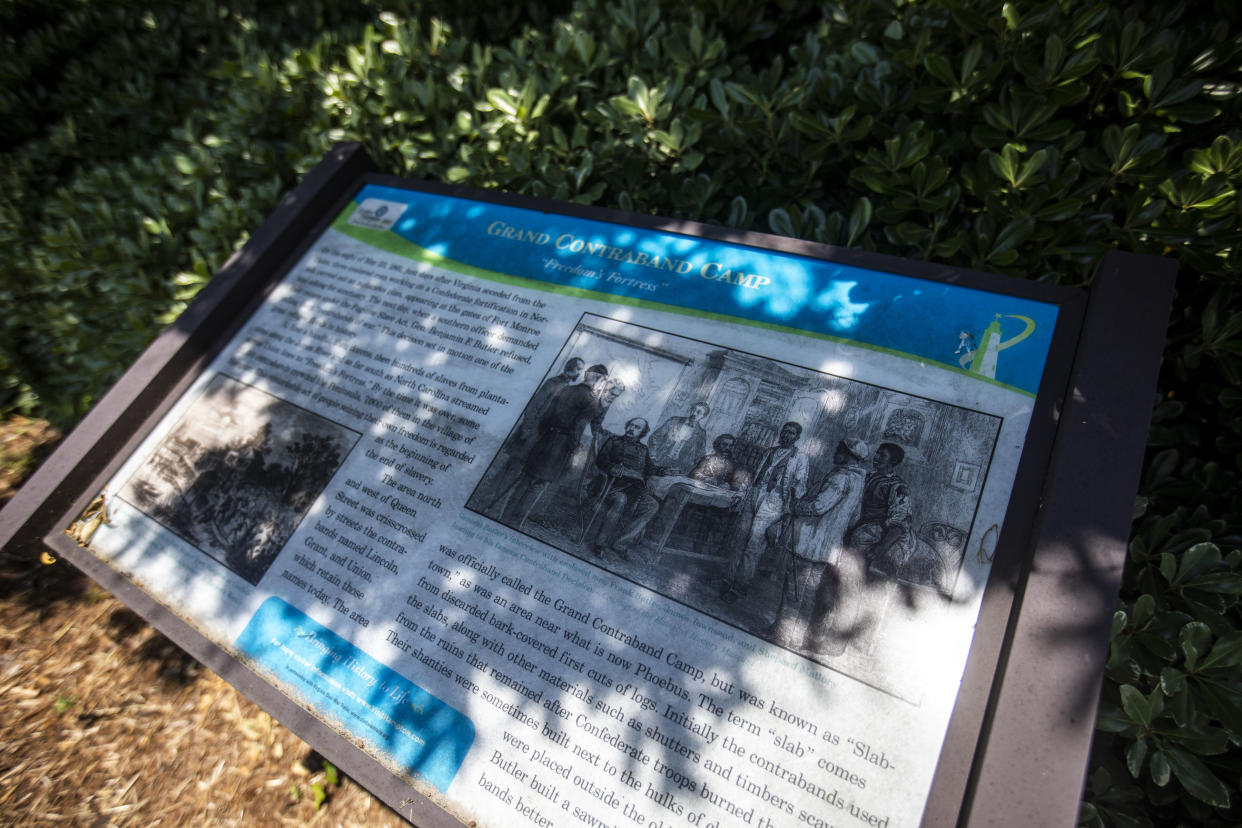Grand Contraband Camp in Hampton listed among the state’s most endangered historic sites

HAMPTON — The Grand Contraband Camp — a place that provided a sanctuary for thousands of enslaved individuals seeking refuge behind Union lines during the Civil War — is listed this year among the state’s most endangered historic places.
Each May, Preservation Virginia releases a list of historic places across the commonwealth facing imminent or sustained threats. The hope is that the list will spur people, organizations and governments to find ways to save these sites.
Other nearby sites on the list included the Suffolk African American Waterman Villages in Suffolk and Lower Surry Church in Surry County.
In May 1861, shortly after Virginia seceded from the Union, three enslaved men working on a Confederate fortification in Norfolk — Frank Baker, James Townsend and Sheppard Mallory — appeared at the gates of Fort Monroe and asked for sanctuary. When a Southern officer demanded their return under the Fugitive Slave Act, which declared all citizens must turn in runaway slaves even if they lived in free states, Union Gen. Benjamin Butler refused, calling them “contrabands of war.”
Word spread of Fort Monroe becoming a place where enslaved people could seek asylum, and eventually, thousands from plantations along the James River and as far south as North Carolina traveled across Union lines to what became known as Freedom’s Fortress.
“The decision made by Major Gen. Benjamin Franklin Butler in response to what those three men did ended up being the first successful beginning of the end of enslavement in America,” said retired history professor William Wiggins, a member of the Contraband Historical Society.
Settlements of asylum seekers sprang up outside the fort, known as contraband camps. The Grand Contraband Camp was located in much of what is now downtown Hampton, stretching from Eaton Street to LaSalle Avenue.
Preservation Virginia warns Interstate 64 expansions are encroaching on cemeteries associated with the camp, blocking access to descendants and researchers trying to identify some of the older gravesites. Overgrowth in these regions led to some graves being lost entirely.
However, the Contraband Historical Society, the Fort Monroe Authority and their partners are initiating a long-term project that will use technology to identify and archive unmarked or neglected gravesites.
Liza Rodman, a member of the Contraband Historical Society, said the nonprofit is determining who owns the properties now sitting on the camp’s site and identifying cemeteries and unmarked gravesites there. The organization will need to work with willing property owners to help preserve those gravesites.
Rodman says that for too long, the history of Black Americans has been marginalized, with much of the historical accounts of the Civil War focusing only on the Union and Confederate armies while the stories of enslaved people and their journey to freedom fall to the wayside.
“These people were leaving their plantations in the dead of night and coming to Fort Monroe in droves,” she said. “And people who have lived in Hampton all their lives don’t know the story.”
The nonprofit hopes to soon begin a pedestrian survey, a method of identifying an archaeological site by walking across an area in an organized grid and recording surface features of significance. Rodman said while they don’t know the exact number of gravesites on the camp’s site, there are likely hundreds — if not thousands.
Rodman said there isn’t a firm timeline for how long it will take to identify and survey all of the sites.
“A lot depends on finding additional folks who want to volunteer their time and dig in with us,” she said. “We need people in all areas to help research this project.”
Preservation Virginia’s annual list of endangered sites has a track record of success. Only 10% of the sites identified by the list have been lost to demolition or neglect, according to a news release from the group. Rodman said the Grand Contraband Camp being listed as endangered “validates our efforts” and “helps us to make the connections we need to make in order to get this history written and in the books.”
“It’s just another tool for us, really,” she said. “And it’s a really significant one. It’s the most significant one I think we’ve had.”
Josh Janney, joshua.janney@virginiamedia.com

